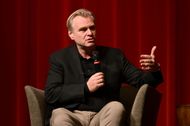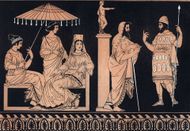Christopher Nolan, the renowned director of Inception and Interstellar, as well as the Oscar-winning film Oppenheimer, is now branching out into ancient mythology with his upcoming project: a cinematic powerhouse adaptation of Homer’s The Odyssey.
The movie has substantial buzz even at this early stage, with the release date set for July 17, 2026, due to its supposed scale, ensemble cast, and the fact that Nolan intends to revive one of the greatest literary pieces of all time.
The budget is set at $250 million, along with an astonishing IMAX advancement in technology—and that’s before filming begins. Nolan’s cast includes Matt Damon starring as Odysseus, followed by Tom Holland, Anne Hathaway, Zendaya, Lupita Nyong’o, Robert Pattinson, and Charlize Theron.
It seems like Nolan’s The Odyssey aims to be more than just a movie; it’s an experience that compels audiences to go back and immerse themselves in the very essence of storytelling.
Why The Odyssey still matters today

Composed around the 8th century BCE, The Odyssey is considered one of the oldest surviving literary works in the Western world. It describes the journey of Odysseus over a period of ten years as he attempts to return home to Ithaca after the Trojan War. In his travels, he faces numerous monsters, such as the Cyclopes’ Polyphemus, the Sirens, and divine hindrances from Poseidon and the witch Circe.
But as with many masterpieces, the poem represents more than an adventure story. It serves as a contemplative analysis of devotion, self, unwavering determination, and the world’s desire for belonging through the notion of ‘home.’ These themes are the reason that The Odyssey has not lost its relevance over the years and has helped shape a myriad of writers and filmmakers.
Nolan’s interpretation: A reinvention, not a replica

Staying faithful to the source material in any medium is a concern for some, but that does not seem to be a particular area of interest for Christopher Nolan. The source material is a poem of epic proportions; it contains 12,000 lines across 24 books, each of which houses a world on its own. Even the most detailed three-hour-long film would fail to capture every subtle nuance.
No need to worry; Nolan has a reputation for dramatic complexity. Consider his previous works; perhaps one of the more inconventionally brilliant choices would be to take up The Odyssey’s non-linear storytelling approach that begins in the middle of the plot and unravels through flashbacks and recasts the story into an intricately interwoven cinematic masterpiece.
True to Nolan's tendencies, this is another idea he will likely approach ingeniously. He is known for quite literally flipping familiar concepts on their heads, and in this case, I suspect he won't use The Odyssey as a source of inspiration, but rather as an outline—a timeless classic recast for contemporary times.
Why now is the time to read The Odyssey

For readers, this celluloid moment comes as a spectacular chance. Nolan's film is on its way, but revisiting the source text or discovering it can deliver striking context. Appreciating Odysseus' voyage, the civilization that conceived it, and the Homeric ornamentation could provide an enriching context for viewing the film.
There's an abundance of English translations available, tailored as prose or poetry, granting a different glimpse into Ancient Greece with every new version. Lore enthusiasts, students, or anyone who enjoys immersing themselves in captivating tales would appreciate having the opportunity to delve into The Odyssey and enjoy it's reimagining through film.
A once-in-a-generation cinematic experience

With The Odyssey, Christopher Nolan is not simply directing a motion picture; he is forging a record with history by uniting ancient mythology with modern-day cinema. In The Odyssey's case, a 2,700-year-old poem, no other adaptation would seem as awe-inspiring.
Not in an age of soft reboots and endless sequels that always feel like the same thing we have already watched. Only a project of this scale is capable of provoking intense attention and critical examination.
You will need a copy of The Odyssey, though. Picking one up is a great ideas before the movie’s release if you want to deepen your appreciation for Nolan's ambitious cinematic endeavors for the decade while also reminding you why stories are timeless.
Love movies? Try our Box Office Game and Movie Grid Game to test your film knowledge and have some fun!
